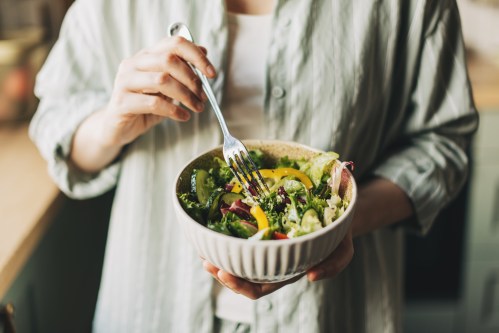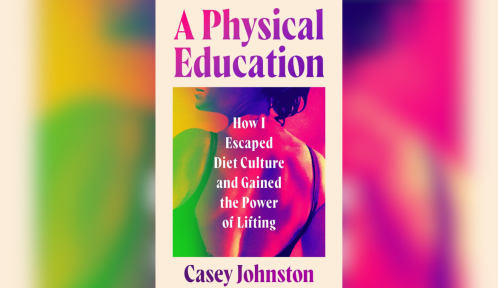Our editors independently select these products. Making a purchase through our links may earn Well+Good a commission
Intuitive eating can be an alluring option if you want to tune into your body, release your food rules, and reduce the stress around your food choices. While being able to eat what you want without being tied to food guilt, feeling the “perfect” level of fullness after eating, or having a good relationship with exercise all sound very attractive are all hallmarks of the practice, all the intuitive eating advice you’ve received doesn’t describe this way of eating completely.
In fact, it’s not based on perfection at all—instead, it’s based on curiosity and learning about your body and what it needs on a larger scale. It’s about seeing each meal as an opportunity to tune into your body to experiment with how you can best feed yourself in the moment. Sometimes we honor these needs and desires better than others, and that’s all part of the learning process.
While intuitive eating may have gained recognition recently, it’s nothing new. In fact, two dietitians, Evelyn Tribole, RDN, and Elyse Resch, RDN, wrote the original Intuitive Eating book back in 1995, and since then, the concept has continued to gain interest, both in the public and scientific community. There is a significant amount of research that links this way of eating with improved mental health and well-being, psychosocial health, and even parents serving more healthy foods at dinnertime.
Intuitive eating is about working with your body, not against it, like diet culture proclaims. For instance, in diet culture, feeling hungry may be seen as a sign of weakness. We may have false beliefs about hunger, such as thinking that hunger between meals is a bad thing, or that you shouldn’t “still” feel hungry right after you finish a meal or snack. Understanding what is normal and physiological is very empowering and can help explain many of these sensations.
So, here are 5 pieces of intuitive eating advice I could have used when I was steeped in diet culture
1. It’s okay to eat outside of hunger
A good relationship with food means understanding that hunger varies each day, and that your needs are distinctive from anyone else’s. You have permission to eat for reasons outside of hunger, such as for social connection, handling emotions, nostalgic reasons, taste hunger, or even eating before you feel hungry if you won’t be able to eat later (a form of hunger called practical hunger). Intuitive eating recognizes that there are forms of hunger that may quench other needs, not just our physical desire to eat.
2. Your weight is dictated by more than what you eat
Your weight is just a number, your relationship to gravity if you will. This number leaves out so much about your health. For example, it doesn’t reflect your muscle mass, what medications you take, your health history, how much you eat, and so much more. Furthermore, things like stress, medications, genetics, hydration status, and other social constructs can also impact your weight too. Spending mental energy stressing about the number on the scale is only worsening your health and well-being.
3. Food can be joyous and more than calories
Diet culture teaches us to view food robotically. Rather than seeing food as pleasurable and satisfying, food and meals are seen as numbers, or viewed as high- or low-calorie or guilt-free. We stress ourselves out by rigidly counting calories instead of tuning in to what our bodies really need. We’re “good” if we eat the “slimming salad,” and “bad” if we go for dessert. Changing this mindset can not only provide empowerment, but also give you the necessary permission to eat for enjoyment and reasons outside of nutrition sometimes.
4. Food doesn’t have to be labeled as “healthy” or “not healthy”
Before finding intuitive eating, I categorized foods as dichotomous: healthy or unhealthy. However, looking at food beyond this lens is transformational for having a good relationship with food, and this is coming from a registered dietitian. All foods truly can fit into a healthy lifestyle, and understanding how these foods make you feel goes a long way. While some of your food choices may be spontaneous, there is usually some intentionality that goes into it. For instance, you may really want a giant bakery cookie and apple for lunch, but you know that your body will feel more energized and satisfied with a well-balanced lunch, such as a sandwich alongside a piece of fruit or salad. Saving that cookie for after or later may be a better option. Neither option is “right” or “wrong,” but one may lead you to feeling better the rest of the day.
5. Thinking about food constantly is usually a sign of under-eating
If you find yourself constantly browsing drool-worthy Pinterest recipes that you’ll never make, or using precious brain space to think about food incessantly, this hyperfocus is usually a sign that your brain and body want more energy. Food deprivation can manifest through food obsessions, slowed metabolism, high levels of the stress hormone cortisol, exhaustion, and even sleep disturbances. While intuitive eating may not be the immediate cure-all for every one of these symptoms, learning how much food your body needs, how certain foods make you feel, and practicing flexibility around your food choices is a step in the right direction.
Sign Up for Our Daily Newsletter
Get all the latest in wellness, trends, food, fitness, beauty, and more delivered right to your inbox.
Got it, you've been added to our email list.











